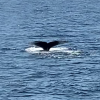After three days trying to save several beached pilot whales in Cape Cod, rescuers' efforts came to an end Wednesday.
Six whales were found stranded on an Eastham beach on Monday afternoon. Rescuers' efforts to get the whales back in water in the high tide were initially successful, but they found the youngest whale dead on Tuesday and then discovered four of the other whales had turned back toward the shore and gotten stranded again.
Misty Niemeyer, an animal rescue officer and stranding coordinator with the International Fund for Animal Welfare, which led the response, said they were cautiously optimistic about the effort but in the end it was not possible to save those four whales that re-stranded. She said all of them were in poor health and were located in an area where it was hard to work. That combined with today's gale force winds and high tide after dark led veterinarians and biologists determine the best course of action was to euthanize the whales.
"These animals just weren't going to be able to survive after being out there for this many days," Niemeyer said.
Rescuers have been unable to find the last of the six whales who originally got stranded on Monday, and they worry it may also be struggling.
"While it does have a temporary satellite tag on it, if the animals are stranded and are in a little bit of water or are not upright, they can be difficult to find," she explained. "In some of our areas of Cape Cod, there's lots of nooks and crannies that are difficult to locate these animals. And so we've had teams out searching for hours this morning and trying to locate that animal."
She said because of Cape Cod's geography and tidal changes, the region is effectively a "trap" for dolphins and whales. It's the site of the most frequent strandings of dolphins in the world, in fact, which means her team has a lot of practice — and a lot of successes — with helping beached animals. But she said pilot whales pose unique challenges because their size makes them both harder and more dangerous to work around.
"Our goal is always to get the animals back out and rescue them when we can. We also always want to make sure we're putting the animal's welfare first and making the best choice for that animal," she explained. "And it can be really hard when your team puts all of their effort and energy and exhaust themselves for days at a time to then have that be the outcome. But that, you know, unfortunately, that is sometimes the reality."








